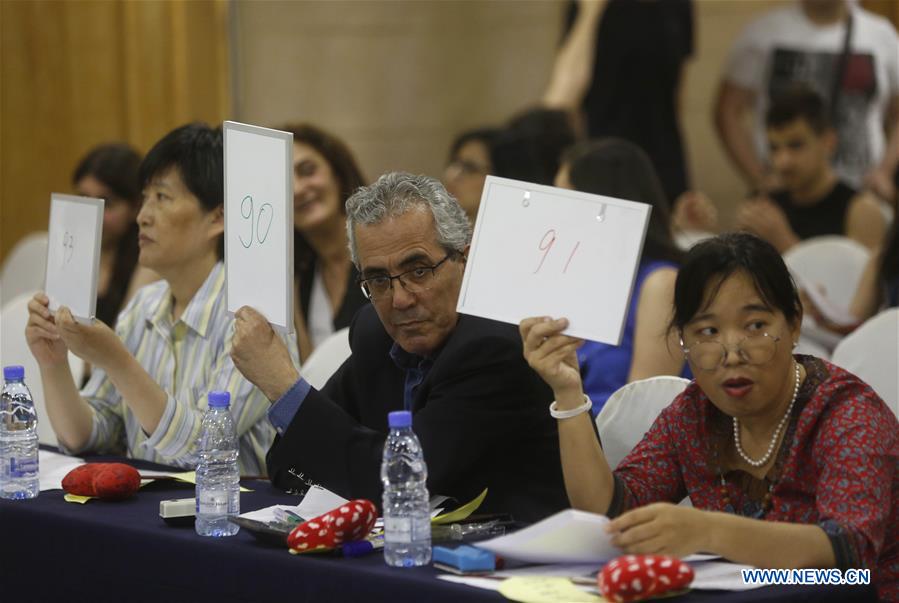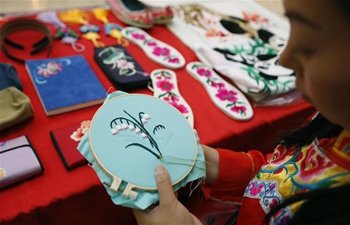
Judges give scores to contestants participating in the "Chinese Bridge" Chinese Proficiency Competition in Beirut, Lebanon, on May 18, 2019. Around 17 Lebanese students participated on Saturday in "Chinese Bridge" Chinese Proficiency Competition organized by the Embassy of China in Lebanon in cooperation with the Confucius Institute at Saint Joseph University (USJ). (Xinhua/Bilal Jawich)
by Dana Halawi
BEIRUT, May 18 (Xinhua) -- Around 17 Lebanese students participated on Saturday in "Chinese Bridge" Chinese Proficiency Competition organized by the Embassy of China in Lebanon in cooperation with the Confucius Institute at Saint Joseph University (USJ).
Students learning Chinese language at the American University of Beirut, the Lebanese University and USJ took part in the competition which was held in Beirut.
The "Chinese Bridge" is an annual competition aimed at arousing the enthusiasm of students in various countries to learn Chinese and strengthen the world's understanding of the Chinese language and culture.
The contest has become important as it builds a communication bridge between young people in China and other countries.
The winners of local contests will travel to China in July 2019 to take part in the worldwide competition there.
The contest on Saturday was divided into four parts, including a speech about self-introduction and life goals, questions by the judges about the speeches, questions about China and related topics, and performances by students to show their different talents using Chinese language or arts.
Students excitedly showed their talents by singing in Chinese, drawing calligraphy, playing musical instruments, in addition to performing Chinese Kung Fu.
"This contest is an encouragement for students to pursue their Chinese education," Antoine Hokayem, president of the Confucius Institute, told Xinhua.
Hokayem said that people all over the world are now more aware of the importance of learning Chinese.
He noted that Confucius Institute was first opened in Lebanon in 2006 and also the first such institute in the Middle East.
"Also, our students in Beirut are increasing by around 10 percent each year which reflects a great interest by the Lebanese to learn Chinese amid the enhancing trade ties between Lebanon and China," he said.
Hokayem added that students who are aiming to work with China must learn the language.
The contest reflects how Lebanese youths have become more and more aware of the importance of the language.
Etienne Debs, winner of the competition, said his aim is to finish his Chinese courses and travel to China to continue his master's degree and then find work there.
"I think the Chinese culture is very interesting and China has been developing a lot lately; it is the second economy in the world and I am sure the language will be of benefit for my future," he told Xinhua.
Rita Maroun, a 22-year-old participant in the contest, has been learning Chinese for the past five years.
She chose to learn Chinese because she believes it is going to be the business language in the future.
"China is big and one of the biggest exporters. I believe that the Chinese language will spread more in the future. This is why I learned it. It will be of a great added value for my future work," she said.
Chinese Ambassador to Lebanon Wang Kejian reiterated the students' remarks by saying that the Chinese language has become more popular because China has developed rapidly in the past years.
"China has more links with the international community and with Lebanon. China and Lebanon are increasingly connected whether in economy, trade or humanitarian exchanges," he said.
He added that based on such connections, the Lebanese, especially young people, feel that learning Chinese can help them better communicate with China and the Chinese people, and they can master a new skill which may provide them with new horizons for their personal developments in the future.
Wang noted that the Lebanese and Chinese governments are currently holding negotiations to sign an agreement aimed at establishing a Chinese cultural center in Beirut.
"If the two governments agree, we will consider setting up a Chinese Cultural Center in Beirut which may be offering more Chinese courses in addition to other projects introducing the Chinese culture. This will provide more opportunities for Lebanese people to learn the Chinese language," he added.















